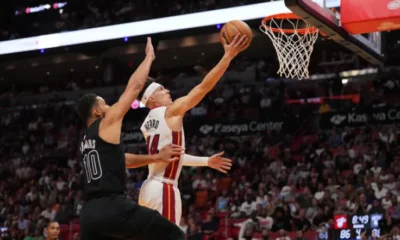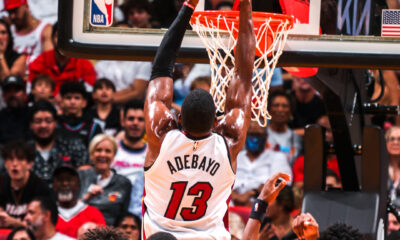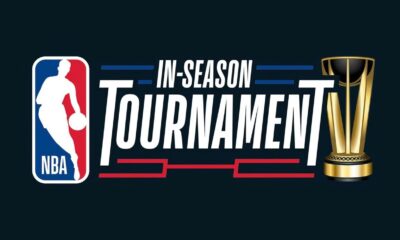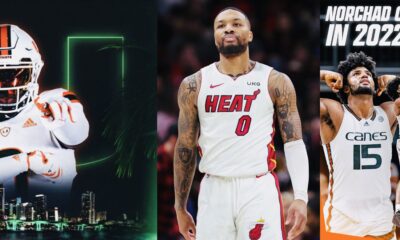Sports
OPINION: Navigating the James Harden Conundrum – A Tale of Misguided Ambitions and Fading Stardom?
Published
9 months agoon

James Harden’s recent actions and comments have showcased a level of tone-deafness and misguided ambition that have left many scratching their heads. As he embarks on his third trade request in less than three years, this time with the Philadelphia 76ers, it’s becoming increasingly clear that Harden’s approach might just backfire spectacularly. Harden’s attempt to make his trade demand personal with public accusations and name-calling is not just a display of poor sportsmanship, but also a reflection of his inability to navigate the shifting dynamics of the modern NBA.
Harden’s history of forcing his way out of teams has given him a sense of entitlement, a belief that contracts are a mere formality, and his desires should supersede organizational interests. However, this approach is a double-edged sword. While he managed to orchestrate trades to get to his preferred destinations in the past, this time around he might find himself on the losing end of this power struggle.
The irony lies in Harden’s misjudgment of his own market value. After opting into his $35.6 million player option, he attempted to demand a trade to the Los Angeles Clippers. However, only three teams showed any significant interest, and none valued him as highly as the Sixers did. This situation exposes a glaring truth: Harden’s star is fading. At 33 years old with a history of on-court decline, he’s not the powerhouse he once was. Teams are no longer willing to bend over backward to acquire him, and his inability to recognize this reality is costing him leverage.
Harden’s assertion that Daryl Morey is a liar might be his way of deflecting blame, but it’s a weak defense. Contracts are legally binding agreements designed to prevent misunderstandings and disputes. While it’s possible that there were miscommunications, it’s equally possible that Harden’s strong self-belief is clouding his judgment. Morey’s role as the President of Basketball Operations involves making tough decisions that benefit the team’s long-term interests, not pandering to individual player demands.
Moreover, Harden’s decision to criticize Morey in public is not just a violation of professionalism but also indicative of a larger pattern of behavior. It’s clear that Harden doesn’t understand the consequences of his actions beyond the short term. His antics might lead to temporary satisfaction, but they also damage his reputation and future prospects. This behavior paints a vivid picture of a player who, despite his incredible talent, is unwilling to adapt, compromise, or consider the bigger picture.
Adding to the complexity, James Harden was reportedly expecting to receive a max contract from Daryl Morey and the Philadelphia 76ers. Despite whether Morey promised it or not, multiple sources have indicated that Harden was under the impression he would opt out and re-sign with Philadelphia on a max deal this summer. However, this apparent understanding clashes with the fact that the Sixers never made an offer to Harden this summer.
Despite the speculations and tensions, Daryl Morey seems unmoved by Harden’s comments and plans to keep him on the team, per reports. This stands in stark contrast to Harden’s goal, “to make the Sixers so uncomfortable that they decide not to bring him back.” Harden’s intent to make things uncomfortable for Philadelphia appears to be his strategy moving forward.
Interestingly, former NBA player and ESPN analyst Kendrick Perkins has shared a concerning perspective, believing that James Harden could be out of the league soon. Perkins stated, “James Harden has everything to lose, and if he’s not careful, he could possibly be out of the league after next year because here’s the thing: You can’t trust him… The NBA doesn’t need him… They move on from old superstars.”
Harden’s dissatisfaction with the Sixers, particularly over a lack of a long-term maximum-level contract offer, is palpable. Sources indicate that he believes the organization’s approach does not align with his championship aspirations. This further highlights the widening gap between Harden’s expectations and the Sixers’ strategies.
In terms of trade negotiations, the Sixers reportedly want draft picks and an elite player in exchange for James Harden. This suggests that the Sixers are aiming for significant returns on any potential deal involving Harden.
Adding another layer of complexity, James Harden apparently only opted into his contract to force a trade to the Los Angeles Clippers. However, the Clippers’ stance in trade talks for Harden has been described as ‘unserious.’ This lack of substantial interest from the Clippers reveals the changing perception of Harden’s value around the league.
As Harden’s standoff with the Sixers continues, it’s evident that the organization is unwilling to bow to his demands. They recognize the importance of maintaining control and protecting their interests. This might be a turning point in the league, where teams become less willing to acquiesce to star players’ trade requests without receiving proper compensation. Harden’s situation might not be unique, as other players like Damian Lillard have also encountered resistance from their organizations this summer.
On the winning end, however, there’s a glimmer of hope for Harden. If he can recalibrate his approach and focus on improving his on-court performance, he might regain some of his lost leverage. A standout season could reignite interest from potential trade partners or future suitors in free agency. Harden’s unique offensive skill set, if harnessed effectively within a team framework, could still be an asset to any organization.
The ongoing drama between Harden and the Sixers is a cautionary tale for both players and teams. Players must recognize that the NBA landscape is changing, and the days of absolute player power are beginning to wane. Teams need to balance their ambitions with a realistic assessment of player value and future implications. The unfolding story of James Harden’s third trade request serves as a stark reminder that the game of basketball is not just about talent; it’s about adaptability, professionalism, and understanding the broader context of the league.
However, it’s important to remember that sports narratives are fluid and subject to change. Harden’s saga with the Sixers might take unexpected turns, revealing new layers of complexity and motivation. While it’s easy to criticize Harden’s actions, it’s also crucial to acknowledge that athletes are human, prone to emotions, and capable of growth. The situation could transform into a redemption arc, where Harden might acknowledge any potential past missteps and strive to cultivate a positive influence both within the game and beyond its boundaries.
In the broader scope of the NBA’s future, the Harden saga could also mark a pivotal moment in the power dynamics between players and teams. As organizations become more assertive in protecting their interests, players might need to adopt a more strategic and collaborative approach when seeking trades or contract negotiations. Harden’s case might serve as a wake-up call for players to assess their value realistically and consider the long-term implications of their actions.
James Harden’s ongoing trade saga with the Philadelphia 76ers is a microcosm of the complexities and challenges that arise in the modern NBA. His actions and comments reflect a player struggling to adapt to the changing dynamics of the league, while the Sixers’ response underscores the importance of organizational control and the willingness to protect their interests. As the drama unfolds, the outcome remains uncertain, but the lessons learned from this saga will undoubtedly shape any future interactions between players and teams in the NBA going forward.
You may like
-


Heat Drop Fourth Consecutive Game, Off to Their Worst Start in Over 15 Years
-


Thoughts and Impressions from the Miami Heat’s Season Opening Victory over the Detroit Pistons
-


Sports Giants Seek to Rewrite DMCA Laws to Combat Illegal Livestreams
-


The MSG Sphere in Las Vegas: A Glimpse into the Future of Sports and Entertainment
-


NBA Cup: Inaugural In-Season Tournament Coming in November
-


Hurricanes Gaining Momentum on Recruiting Front, US Soccer Controversy, NCAA Drug Tests (Marijuana), Norchad and Miami Tropics (Pilin), Heat’s Pursuit of Lillard
Legal


University of Florida’s Groundbreaking mRNA Vaccine Could Revolutionize Treatment for Brain Cancer Patients
In a landmark achievement in the battle against malignant brain tumors, a revolutionary mRNA cancer vaccine has ignited a robust...


NCAA Intends to Enhance Consumer Protection in Ever-Changing NIL Era
Charlie Baker, the president of the NCAA, has expressed the urgent need to establish a “consumer protection system” tailored for...


Redefining the Game: How One Attorney’s Fight Could Revolutionize College Athletes’ Rights
John “Jake” Krupski, a seasoned labor attorney from New Hampshire, was well-versed in representing the rights of various workers, including...


Clemson Files Lawsuit Over ACC Grant of Rights, Looking for Exit Out of Conference
In a bold move that reverberates across the collegiate sports landscape, Clemson University has taken the Atlantic Coast Conference (ACC)...


The Enhanced Games: A Controversial Pro-PEDs Take on the Olympics
In a daring departure from conventional sports norms, billionaire entrepreneur Peter Thiel, co-founder of PayPal and Palantir, is making waves...


Lawsuit Against Mars Inc. Claims Dark Chocolate Contains Toxic Metals
A proposed class action lawsuit has been filed in New York federal court claiming Mars Inc. failed to warn consumers...

